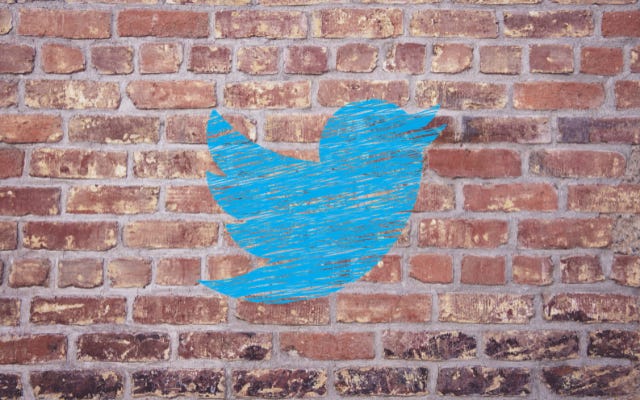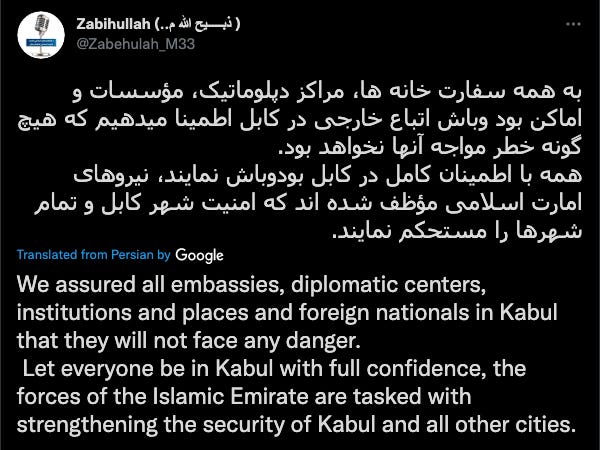Why the Taliban Is Allowed on Twitter, But Trump Isn't
It's pretty simple.
Zabihullah Mujahid is a spokesman for the Taliban, the oppressive Islamist military organization that has taken over Afghanistan in the last week.
Mujahid has a Twitter account and, to this point, has not been banned or otherwise barred from communicating on Twitter. This has predictably caused a bit of an uproar, especially within groups of people who are politically conservative.
Some have asked why a leader in the Taliban, a group that demeans and hurts women, can have a Twitter account, but people conservatives who question the gender of transgendered persons get suspended from the platform.
Others, like Fox News, have wondered why Twitter would allow a leader of the Taliban to tweet while former President Donald Trump remains permanently banned.
I think there is a pretty simple answer. Whether or not it is a good answer is a matter of debate, but there shouldn’t be any wonder why a Taliban leader can tweet but the former President of the United States cannot.
How to Get Banned from Twitter
The way you get banned or suspended from Twitter is rather simple: break their rules on their platform.
You will rarely catch me defending Twitter for how they moderate content and enforce their rules because I think they can be inconsistent now and then. At the same time, while I won’t defend them, I tend to not criticize Twitter or other social media platforms for how they attempt to enforce their rules. I’ve studied how this stuff works enough to know that every seemingly “easy” decision has ripple-effect consequences that a lot of people simply don’t think about as they gripe about who is or is not banned.
But, despite some inconsistency at times, there is one aspect of Twitter rule enforcement that is always consistent: Twitter enforces their rules primarily based on what an account does on Twitter, not what a person does off of Twitter. This reality is at the core of why former President Trump cannot use Twitter and a leader of the Taliban can.
We should want Twitter to operate this way! Twitter shouldn’t decide who can and cannot use its platform based on who its users are or what they have done off of Twitter. Do I wish that the leaders of a violent Islamist political group were not allowed to use Twitter? In one sense, sure. But unfortunately Twitter doesn’t have a “basic human decency” rule that allows them to prevent users from ever using the platform because they’re run-of-the-mill jerks or leaders of murderous movements. How would they even enforce that? They couldn’t, and I would say we don’t want them to!
The way Twitter’s rules and the enforcement of those rules work is like this (as I understand them):
A murderer can set up Twitter to tweet solely quotes from The Office all day, but a wealthy, well-to-do suburban mom can be banned for harassing a transgendered person on Twitter.
Are the murderer’s crimes more morally repugnant than the suburban mom’s actions? Of course. But the murderer didn’t kill anyone on Twitter. His immoral, criminal actions are outside of Twitter’s jurisdiction. The mom took action that goes against Twitter’s rules on Twitter, which means Twitter can act. It’s really not that hard to understand.
The reality is that, this is sorta how it has to work, right? Unless Twitter makes every user apply to use the platform like they’re applying for a job, submitting to background checks and providing references, it is virtually impossible to prevent “evil” people from using your platform until they break your rules. However, that is similar to how verification works, and we’ll explore more of that later.
Let’s get into two specific, high profile examples of why Twitter has and hasn’t banned people.
Why Trump Is Banned
Some believe that former President Trump was banned from Twitter because of things he said on television or otherwise offline during and after the January 6 attack on the U.S. Capitol. This is incorrect.
Twitter explained why they banned former President Trump in a blog post on January 8, 2021. They write at the beginning:
After close review of recent Tweets from the @realDonaldTrump account and the context around them — specifically how they are being received and interpreted on and off Twitter — we have permanently suspended the account due to the risk of further incitement of violence.
In the context of horrific events this week, we made it clear on Wednesday that additional violations of the Twitter Rules would potentially result in this very course of action. Our public interest framework exists to enable the public to hear from elected officials and world leaders directly. It is built on a principle that the people have a right to hold power to account in the open.
However, we made it clear going back years that these accounts are not above our rules entirely and cannot use Twitter to incite violence, among other things. We will continue to be transparent around our policies and their enforcement.
You can read the whole post explaining their action here.
Twitter banned President Trump based on a couple of tweets that Twitter interpreted as, “likely to inspire others to replicate the violent acts that took place on January 6, 2021.”
It is clear from Twitter’s post that former President Trump’s two tweets on January 8 (cited in the post linked above) were the primary impetus for his permanent suspension, but, as they say at the beginning, they reviewed these tweets in the context of real-world, offline events. If former President Trump simply tweeted a daily Washington, D.C. weather report every day, for example, he wouldn’t have been banned from Twitter.
So, in the case of former President Trump, Twitter took action based on what the former president did on Twitter, informed by what was taking place off of Twitter. Their action was rooted in Twitter activity, but their decision didn’t take place in a vacuum. This is wise, I think.
The former president broke the rules and he faced the consequences. It really is as simple as that. But what about Zabihullah Mujahid? Why isn’t the spokesman of a murderous Islamist political organization banned from Twitter?
Why Mujahid Isn’t Banned
The spokesman of the Taliban is allowed to tweet because being a leader in a murderous Islamist political organization isn’t against Twitter’s rules.
I confess, I have not gone through all of Mujahid’s tweets and translated them to English to see for myself whether or not his tweets have broken Twitter’s rules. But I did translate about a dozen tweets from the last few days, and none of them break Twitter’s rules. Here is one of them:
I am sure that if and when Mujahid breaks Twitter’s rules by using the platform to incite violence or otherwise, Twitter will take action on the account. But being a leader in the Taliban isn’t against Twitter’s rules, nor is being President of the United States, nor is inciting a coup on national television. But as soon as any incitement of violence or other related transgressions of Twitter’s rules take place on Twitter itself, Twitter tends to act.
Likewise, and this is a bit of a minor note, but an important one I think: Mujahid is not verified on Twitter. This matters for a couple of key reasons. First, it matters because Twitter tends to act more swiftly on accounts that are verified. Why do they do this? Is it because they have a vendetta toward verified accounts? Of course not. It is because the platform has actually verified that the account is being used by the person it claims to be. That leads to the second reason it matters that Mujahid is not verified: Twitter has no way of knowing this is actually Mujahid. It could be some other Taliban member. It could be a random Afghan citizen. It could be a 16-year-old American kid bored in honors chemistry (unlikely).
Of course, there are ways Twitter can attempt to decipher the location and other key information from this account, but Twitter hasn’t verified this account which means they truly don’t know who is using it. That means if they banned it, Mujahid (if it’s actually him) could just create another account with another email and be a bit more discreet about what he’s doing.
For one reason or another, perhaps by the time this post is an hour old, Twitter could ban Mujahid’s account. Like I said already: they can be a bit fickle about these things sometimes. Or maybe Mujahid uses the account to tout the murder of Kabul residents and call for violence. That would certainly get the account banned. But I don’t expect him to do that. Why? Because he likely knows it would get his account banned and he would lose access to one of the loudest microphones in the world.
Social Media Moderation Is Impossible
Whether it’s a leader of the Taliban, the former President of the United States, or your favorite professional pundit, access to Twitter doesn’t depend on your politics or your criminal record. It depends on how you act on Twitter. This is good.
Twitter has clear rules that they, unfortunately, don’t always clearly enforce. Content moderation, monitoring user conduct, and enforcing rules make up the unholy trinity of perils that accompany running a modern social media platform. I try to give platforms a little bit of grace when it comes to enforcing their rules because while missteps are easy to criticize, most of us don’t realize how often they actually get it right, and how important it is that they do so.
There are plenty of scenarios in which it is appropriate to call attention to mistakes social media platforms make in their moderation, but to perfectly moderate content and monitor users is impossible, and this is why I am usually slow to criticize who is or isn’t banned and why. It’s an imperfect system, but it seems to me like these platforms, Twitter included, really do a good job the majority of the time.
I don’t like that someone like a leader in the Taliban has access to the global microphone of social media, but I’m not sure I want social media platforms to start evaluating users’ offline lives to determine their online privileges. And I’m guessing you don’t, either.



